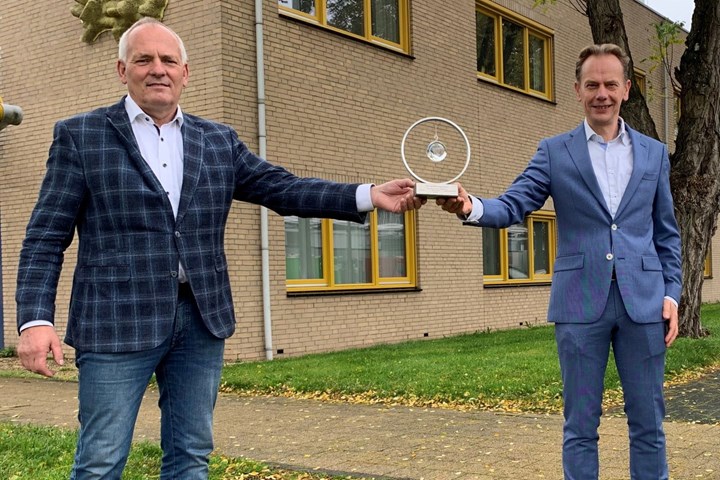Teijin Aramid program produces bio-based, high-performance aramid fibers
The 2018 pilot program, in partnership with BioBTW, successfully produces Twaron yarn from bio-based aromatic materials without altering the material properties.

Handing over the bio-based Twaron showcase to Henk Brink, Depute of the province of Drenthe by Edward Groen Operations Director Teijin Aramid. Photo Credit: Teijin Aramid
Teijin Aramid (Arnhem, Netherlands), part of the Teijin Group, has announced successful results of a sustainability-focused pilot program, which has been focused on developing high-performance aramid fibers from renewable, bio-based materials. According to the company, the program has now proved that this innovative approach can improve the environmental impact of Teijin Aramid’s production processes, without altering the material properties of the resulting Twaron aramid yarn. The results were revealed at the Chemport Connect – Biobased and Circular Polymers event, which took place on Nov. 17.
The pilot program came about with Teijin Aramid’s aim to transition to greener, renewable materials as part of its long-term sustainability ambitions. The company began its focus with its ultra-high-strength para-aramid fibers under the brand name Twaron, which are typically composed from finite, fossil-based raw materials.
In 2018, Teijin Aramid joined BioBTX (Groningen, Netherlands), a company that transforms renewable resources into chemical chemical resources, and Syncom, a research organization specialized in organic chemistry, in a pilot program to explore production of Twaron yarn from bio-based benzene, toluene, and xylene (BTX) aromatic compound materials. The aim was two-fold: first, to determine the potential reduction in CO2 emissions, and second, to assess whether the transition alters the unique material properties of Twaron yarn. The pilot took place on a laboratory scale, with assistance from Chemport Europe (Netherlands), and financial support from the provinces of Drenthe and Groningen. The three companies reportedly worked in close alignment for more than two years, finding creative solutions for the technical challenges that arose during the project.
According to Teijin Aramid, the pilot moved the company closer to its goal to use low-carbon solutions and increase the use of renewable carbon in its raw materials. The company’s ultimate ambition is a fully circular aramid chain; this will require innovative approaches, such as the development of recycled raw materials from plastic waste, as well as increased collaboration between different partners across the value chain.
“We are pleased with the outcome of the pilot, which has delivered useful insights to each of the parties involved. Our work with BioBTX and Syncom represents an important step forward on our sustainability journey and underlines the importance of collaboration as we work toward our goals,” says Peter ter Horst, CEO at Teijin Aramid. “Our Twaron yarn is inherently green due to its sustainable value; this important cooperation with our partners is the next step as we work to create a better world for future generations. I am proud to see us moving together in the right direction, and I also thank the provinces of Drenthe and Groningen, as well as Chemport Europe, for their invaluable support.”
Related Content
-
Natural fiber composites: Growing to fit sustainability needs
Led by global and industry-wide sustainability goals, commercial interest in flax and hemp fiber-reinforced composites grows into higher-performance, higher-volume applications.
-
Airbus works to improve the life cycle of composites in future aircraft
This companion article to CW's September 2024 Airbus Illescas plant tour discusses recycling, LCA, biocomposites, Fast Track technologies, qualification and more.
-
Bio-based SiC ceramics from wood polymer composites
Austrian research institute Wood K plus makes 95% silicon carbide ceramics more sustainable (>85% bio/recycled content), enables 3D shapes via extrusion, injection molding and 3D printing.














